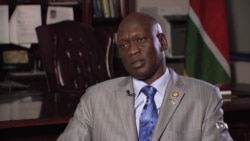Hours before a deadline to once again reach a peace deal that would end 15 months of violence in Africa’s newest country, South Sudanese President Salva Kiir and rebel leader Riek Machar are meeting in the Ethiopian capital, Addis Ababa. To step up pressure on both parties, the United Nations Security Council adopted a resolution Tuesday to possibly impose sanctions if a deal is not reached by Thursday.
South Sudan’s newest ambassador, Garang Diing Akuong, representing his country in the United States, said his government is not sure what might be next if the talks in the Ethiopian capital fail to produce a peace deal.
“The plan B we’d like to initiate as a government is to continue with the peace process, to continue to implement agreements that have been signed, continue to abide by the cease-fire agreements that have been signed," said Akuong.
The U.N. Security Council Tuesday unanimously adopted a resolution to put sanctions on South Sudan's warring factions as the deadline to reach a peace deal quickly approaches. Ambassador Akuong said he’s really not in favor of the resolution that was drafted by the U.S. delegation led by Ambassador Samantha Power.
“We are very, very disappointed; as a government we are very dismayed by sanctions because we think that sanctions will not resolve any problems in South Sudan. Instead, it will aggravate the situation more. Also, sanctions will send the wrong signal to the rebels," said Akuong.
Ambassador Akuong said his government was surprised because it has held many discussions with its American friends.
“We have tried to talk and engage with Americans who are the sponsors of these sanctions to express our view that sanctions will not solve any problems in South Sudan; that instead keep engaging the parties as it used to do during the Naivasha agreement, and I think the United States has a moral obligation to continue to support South Sudan, continue to support any peace and reconciliation in South Sudan,” he said.
The U.S. delegation led by Samantha Power said the measure is intended to support regional group IGAD’s mediation efforts between the parties, and that a young generation’s future is being held ransom by political actors who, despite all costs, refuse to compromise.
“This cannot continue and those who frustrate peace must begin to pay the price,” said Power.
Akuong is calling on the world to help bring peace to his country, where fighting broke out 15 months ago after President Salva Kiir, an ethnic Dinka, accused opposition rebel leader Riek Machar, an ethnic Nuer and his former vice president, of trying to oust him in a coup. Their dispute started ethnic attacks and fighting between government troops and rebels, despite several cease-fires that did not hold. According to the U.N., the fighting has killed thousands and displaced 2 million people.





